PATRICK ALEXANDER
POET AND PERFORMANCE ARTIST
By Peter Davis
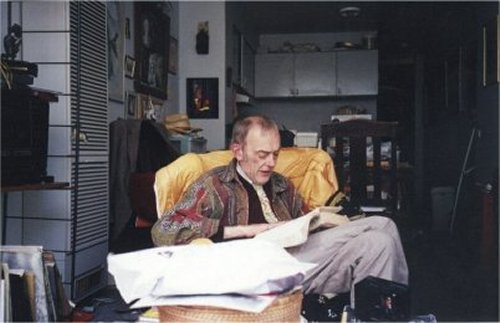
[Above] Patrick at home. (Photo by Bill Cobbett, 1998-2003)
PART 1
This article has been written by Peter Davis with also quoted contributions by Andy Jackson, John Edwards, Nicole deWilde and Tim McKew. Poetry included is by Norman Jensen, Cornelis Vleeskens and Pamela Sidney.
The old cat and the poet:
I remember how Patrick Alexander used to love my house cat, Weasel, that was nineteen years old and skinny and frail just like Patrick. They both would fall asleep at regular intervals, while in company. Each also had large eyes, which would stare into spaces where shadows drifted.
Weasel could fall asleep while in the middle of grooming himself. He fell asleep sometimes in mid-lick, his head suddenly ceasing in a statuesque pose, while his tongue remained extended along his brindle-coloured paw. Then the old cat would wake up and continue immediately licking, as if he had never paused.
On one occasion, while hosting a dinner party, I had tried to make a joke of Weasel's somnolence to my guests. Everyone had laughed as I had hoped except for Patrick, who became silent as he stared at the cat's continual drifting between sleep and consciousness. Patrick had raised a finger to chastise us for laughing loudly and possibly disturbing Weasel's rest. Then he tried to stroke the fur of Weasel with a trembling hand.

[Above] Patrick A, Joanna Robertson and Ken Stewart (Photo by Harold Ciddor, 1961)
As soon as Patrick touched Weasel's back, the startled cat, within a breath of waking, swiped at Patrick and sunk one of its wonky claws deep into his soft poet's flesh. Everyone in the room except for Patrick was aghast. Nobody spoke for a few moments, as we watched the thick trickle of blood move on Patrick's hand.
Weasel had also looked toward his claw. The cat gazed wearily, as if in his partial blindness he had struggled to see whether his aim had indeed reached its target. Then with his claw still in Patrick's hand, Weasel returned into another gentle sleep.
"No, no, don't move anything," said Patrick as people quickly stood and came towards the two in conjugation. "It's his house, his couch and I shouldn't have woken him. Now I shall just have to wait till he is awake. No, no, don't fuss!"
"Perhaps he mistook you Patrick for a piece of old liver," said our friend, Tim McKew, a cabaret performer.
'Well," replied Patrick, "he probably preferred that choice to your very enlarged heart. Yessss."
Patrick Macgillicuddy Alexander was born in Dublin in 1940. A respected Melbourne poet and spoken-word artist, he died from a heart attack while walking near his terrace home in Fitzroy on 21/9/05. A heavy smoker who suffered from emphysema, he was 65.
Patrick Alexander is the only artist to have produced an event for every Melbourne Fringe festival since the Festival began in 1983, and he was made an honorary life member of Fringe for his contributions, the only person to be accorded the honour.
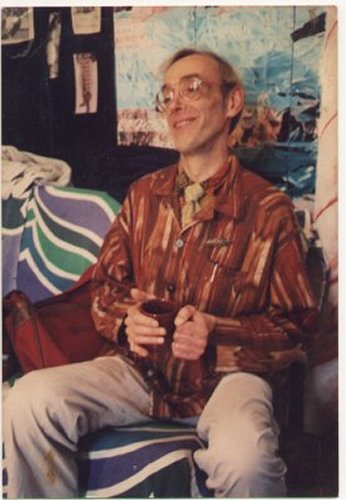
|
Furthermore, the Melbourne Fringe Festival has decided that the festival award for spoken word performance will be called the Patrick Alexander Memorial Award.
The following is a description of Patrick written by a Melbourne poet named Andy Jackson: 'Patrick Alexander had the most majestic awkwardness I have ever encountered. A few years back, when I ran a cafe in Collingwood by the skin of its financial teeth, he would stagger-prance in, his long face inches from mine, tufts of grey hair at his cheekbones, his spidery hands a-tremor and plead child-like (often with spittle at the corners of his mouth) for "a latte until Wednesday". I could never say no to him, no matter how strained I was by busyness or my own poverty. His sonorous and gleeful thankyous still resonate. The way he spoke, the way he moved, made some truths inescapable - his bones, his fragility, his inner dramas, those human things many of us won't admit to. I miss what he brought home to me. I miss him. I carry Patrick in my body.'
From 1946 until 1959, Patrick Alexander lived in London, where he received training as an actor at the Royal Academy of Dramatic Arts. It was during this period that he began to write poetry. |
[Above] A happy shot of Patrick. (Photo by Bill Corbett, 1998-2003)
He arrived in Melbourne in 1960 and, apart from eight years in Sydney, lived there. Patrick had a prodigious memory that was a sign of great intelligence, but the bi-polar disorder he developed as a teenager meant his life could either be a fearless walk along a tightrope or a fall into the darkest of chasms.
Dressed in large, colourful ties and wearing a brooch on a stylish jacket, Patrick was a loved Fitzroy character. His greatest luxury was having coffee with other local artists in Gertrude Street. " 'Should' is a word that we don't use in this kindergarten" was one of his favourite sayings, which he shared with friends.
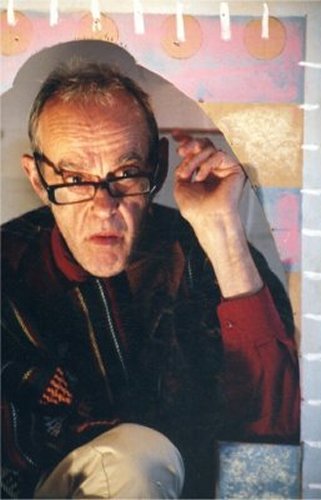
|
The following is an anecdote which may illustrate the eccentric side to Patrick's character. It was told to me, over the phone, by Francis King (a friend of Patrick's from Lismore, New South Wales):
"Patrick was an insomniac. He would regularly enter my room at 4am and sit on the end of my bed, where he would read his own poetry to me until I woke. Or else, if he couldn't find a way into the house, he would read outside my bedroom window with a booming trained actor's voice.
I could handle this disturbance a few times but not every night, which soon became the case. I began to have the physical and mental symptoms which come from a prolonged lack of sleep.
I remember that I was feeling particularly stressed, around the time of Christmas morning, 1972. Gambits of misfortune were occurring in my personal life: a relationship had just ended, my cat was ill and also there had recently been a falling out with my relations; not to mention the strained relationships with my neighbours due to Patrick's nightly performances.
'Patrick, I've had enough,' I yelled from my window that Christmas morning. He then continued with his reading. I next remember grabbing a carving knife from the kitchen and running with it outside, while still naked. I then chased him along the street.
'If you don't stop reading your poetry, I'll kill you!' |
[Above] Patrick framed. (Photo by Bill Corbett, 1998-2003)
I would become exhausted and stop running. Then Pat would stop running and start immediately reading his poetry again, his eyes like light bulbs. Then I would chase him again and so on.
I heard that later, after I had given up my chase, Patrick found a public phone box. He then called Lifeline and spent fours hours talking and reading his poetry to that person."
John Edwards, a close friend of Patrick's since the 1960's, is an actor, historian and writer. He writes: "The Alexanders were a remarkable family by any standards. Patrick's father, Hugh, was a chess champion and one of a team of mathematicians who cracked the Nazi 'Enigma Codes' during WW2. Hugh was awarded an OBE in 1946, a CBE in 1955 and a CMG in 1970. He died in Cheltenham in 1974. Patrick's mother, Enid graduated from Melbourne University. in the 1920s. She went to Paris and obtained a Doctorate in French Law at the Sorbonne! Enid, also graduated as a Cordon Bleu cook. Hugh and Enid were married on 22 December 1934 in London. Hugh had a teaching post in Winchester and Pat's brother Michael was born there in 1936. Enid's grandfather was James Macgillicuddy, one of the leading miners involved in the revolt at the Eureka stockade. Pat's brother, Michael, had a long career as a diplomat for the British Government and died in 2002. Michael also won a silver medal for fencing at an Olympic games."
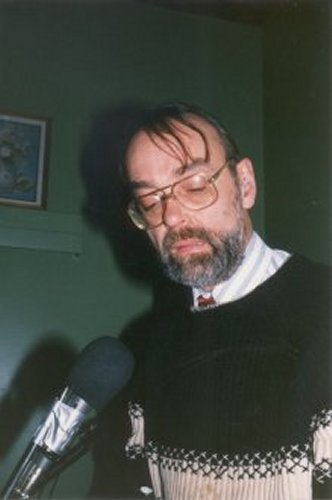
|
Patrick Alexander's poetry was published in The Age newspaper and many literary journals, and he will also be remembered for his great artistic knowledge that became an invaluable resource for many young artists and writers.
Patrick published seven books of his poetry, including The Weight of the Glass (Earthdance, 1999) and Images, Reflections: gathering tributes (Earthdance 1995). The State Library of Victoria lists seven of these publications, although they managed to put four of those under a P.A. born in 1926!
Patrick read poetry by William Blake and Constantine Cavafy to audiences at the National Gallery of Victoria, and he was a featured reader at Melbourne poetry venues such as the Rochester Castle, The Perseverance, Monsalvat, The Spinning Room and the Dan O'Connell Hotel. He also frequently sang with the Paul Williamson Combo at The Rainbow Hotel to close the show. He is particularly remembered for his renditions there of 'Stormy Monday'.
Patrick also had a deep love of the performance style of Billie Holliday, whom he thought was able to impart, at certain moments, every bit of her soul into her live presence. Patrick often sang unaccompanied for a live poetry audience. He performed songs such as those performed by Billie Holliday. As was also the case with Billie Holliday, it did not matter that Patrick did not have a classical sounding voice; his voice rather was unique and rich with emotion. |
[Above] Patrick performing at the Perseverance Hotel in Fitzroy. (Photo by Pamela Mimi-Sidney, 1987)
What amazed many people also was how Patrick could perform so energetically, when at times he could hardly manage to hold a cup of tea, because his hands and body shook so much from essential tremors. I recall a reading he did of Blake's 'Second Night of the Four Zoas', which he started with a friendly and light-hearted joke to his audience, about some problem he was having seeing the page with his glasses. Then, within moments, his voice was ablaze and the old roof beams of a Melbourne poetry venue seemed suddenly to shake. Patrick also knew when to recite a poem in a quieter voice. One example, which many people would recall of Patrick's ability to read quietly and yet with emotional power, were his recitations of poems by Constantine Cavafy.
The following contribution is by cabaret artist and jazz singer, Tim McKew: "I first met Pat when I was 20 years old. A mutual friend, Nicole de Wilde, brought Patrick over to my parent's house in Port Melbourne, where I was living at the time. He seemed like some being out of a fairytale. He read Blake to us, in my bedroom. It seemed like the whole house was vibrating. My mother yelled, "What are you doing up there, Timmy?" It must have seemed like we were acting out some arcane ritual. Well, I guess we were; or at least Patrick was. Patrick soon became one of my dearest friends. Through thick and thin, he always encouraged me, when all seemed impossible. During my struggles as an artist sometimes to keep going, he would say, "Courage, Camille!"'
Pat was recognised as one of Melbourne's best live poetry performers, whether reading others' works retrospectively or his own material. His performances in full of Ginsberg's 'Howl' are unforgettable to those lucky enough to have been present. Another poem he is remembered for performing is D.H. Lawrence's 'The Ship of Death'.

[Above] Patrick A, Joanna Robertson and Ken Stewart (Photo by Harold Ciddor, 1961)
The following poem was written by a close friend of Patrick's in the latter years of his life. The writer is Norman Jensen and he has written this poem about a live performance by Patrick of Pat's poem 'The Red Shoes', which was based on the fairytale about a magical and fatal pair of red dancing shoes.
OF PATRICK ALEXANDER READING 'RED SHOES'
"Dance, ah, dance:" (that with eyes lifted)
"sometimes when I hear sap,"
the cut blood of the Tree of Knowledge,
Patrick Alexander would cry to us who might
understand "poor mother
turned a witch".
But his passion was reserved for
"The shoes, father, the shoes"
(eyes direct us down below the lectern,
below the stage, all in the twinkling of an eye)
"red, red - too red ..."
all in passion, all in tears
(that leapt so far from his face
that they landed on our hands),
all in something that might have been a scream:
"No!" I yelled, and yanked the axe from out my belt"
as Gilgamesh might have done before he realized,
"And hacked
and hacked ..."
And telling us
"I did not know the word
'compulsion'
but I understood it now and dimly wondered
what my red shoes would be." It burnt
my dear Patrick, not following 'his Bliss'
but following
whatever his Music wanted him to be.
Whatever he wanted his Music to want him to be.
In concluding part one of this article, let us remember Patrick both for his loveable eccentricity and his deep passion for the arts. Characters of such magnitude appear rarely. He was a combination of many things: an extraordinary family upbringing that gave him an appreciation of visual arts, theatre and poetry. He suffered a serious head injury as a young child, when a steel farm gate fell upon his head, which likely resulted in long-term injury. His bipolar disorder also meant he continually suffered. In poverty, Pat always tried to be generous, often returning a reading of live poetry for a dinner invitation. When he borrowed money from others (which was often), he would pay every cent back on his next pension day and immediately be broke again. And we can remember and appreciate Patrick most for his artistic temperament: his gift of originality in conversation and friendship.
PART 2
The second part of this article contains descriptions of Patrick, which were contributed by two of his closest friends and colleagues in the arts: John Edwards and Nicole deWilde. There are also poems written in dedication to Patrick by Pamela Sidney and Cornelis Vleeskens.
Nicole deWilde, a close friend of Patrick's since the 1950's, is an actor and theatre producer, writes: "Patrick was everything one would expect of a 6'4" Irish, manic depressive, Piscean poet born in the year of the dragon. He was endearing, infuriating, charming, funny, often outrageous and immensely creative. He often said of himself that he felt he had no gift for intimate relationships but a great gift for friendships. Ours lasted forty years.
I first met Pat when I was twelve and he was twenty. My grandma and his mum were friends. He appeared one day on a bicycle: a tall streak of a boy, with shaggy blond hair and the most beautiful voice I have ever heard. We often joked about the "rellys"; of their holding fond hopes of a romance between us. Pat's orientation was gay. He also adored the company of women. Female company gave him the opportunity to be the Irish gentleman and he always arrived with gifts: vintage dresses, flowers, books and, of course, hand written poems. He wrote two for me: 'Nicolissima' and 'Out of school'.
Patrick's bipolar disorder and his fondness for simply ceasing to take his medicine, led to huge manic swings. Then later in his life were long grey depressions, which could make life difficult for his friends and himself.
I recall a dinner party to which I had prudently omitted to invite Pat, knowing he was in a state of upswing, related to his bipolar disorder.

|
With unerring instinct, he arrived, as we were about to dine. Patrick downed several glasses of wine in the first five minutes and then proceeded to eject red fluid, all over the dining table. Ten minutes later, the last guests had disappeared and I spent hours following Pat around and cleaning up after him. I was not happy!
I woke the next morning to find him sitting on the end of my bed. With a winsome smile he said, "I just thought you might like to hear some Edward Lear". Patrick could always get around me with that Irish charm.
John Edwards writes: "As a friend, Patrick was, above all, loyal and non-judgmental. When I once became the target of false accusations from some arts colleagues, it was Patrick alone who refused to listen to the scuttlebutt and continued to offer me his friendship. He was as generous as his limited finances allowed him to be. At the same time, he could be an annoying companion. He would occasionally be outrageously selfish, such as ringing at 3.00 a.m. to tell me he had problems with his teeth! This was of course all part of his illness and he was only too aware, one might say obsessed, with his failings and apologetic for them. His friends made allowances as best we could and I think he really appreciated those friends that would keep him in line and not allow him to get away with too much! |
[Above] Patrick out and about. (Photo by Bill Cobbett, 1998-2003)
On one of his visits to Sydney, Patrick was sporting a nasty-looking fingernail, which had become infected and was full of pus.
'You really should get that seen to,' I told him.
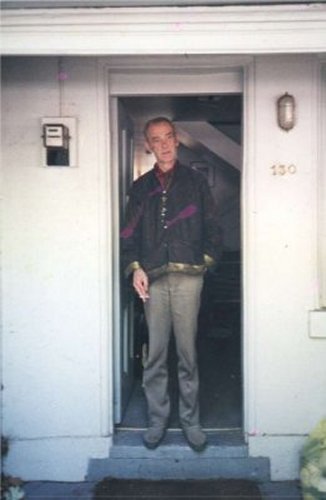
|
He eventually agreed and as we were in the Kings Cross area that night, he decided to visit the Outpatients clinic at St Vincent's Hospital to see if they could do the job. Like a dutiful friend, I waited outside while Patrick was seeing the doctor. All at once, a huge bellow of pain came from the cubicle, the hideous scream of a thousand banshees!
I had visions of torturers pulling out fingernails and was angry about his possible mistreatment by a doctor. Surely if lancing the nail was so excruciating, the medical staff should have given any patient a local anesthetic first. A few minutes later, Patrick emerged, bandaged up and looking surprisingly unfazed.
'What on earth are they doing to you?' I asked. 'Surely they should have given you a local if it was going to be that bloody painful!'
'Oh, It wasn't that bad,' he replied. 'I always over-react to pain. It's more the anticipation than the reality.'
And with that, we set forth into the night."
Nicole deWilde writes: "Patrick always retained a lot of the child within. He had been so protected and cosseted by his formidable and fabulous mother, Enid, that he really didn't want to let go of that childish persona, which made him sometimes very needy and attention seeking, as well as special. |
[Above] Patrick in doorway. (Photo by Bill Corbett, 1998-2003)
I was directing Patrick in a play called The Scavenger (Francis King) at the old Alpha House building in Newtown, Sydney in the 1980's. I recall that whenever Pat wanted attention, he would announce loudly and dolefully, 'I'm only a small thing.'
This regular announcement by Pat was starting to cut across rehearsals. So I primed the cast and the next time he did it, he was met with a rousing rendition of:
'Oh no you're not a small thing
in fact you're a very tall thing
a large and wall-to-wall thing
and so say we all!'
After his initial shock, Pat liked our rendition and it did settle things from then on.
The following is a poem written by Pamela Sidney, a Melbourne performance artist and poet and a close friend of Patrick. Together they shared many afternoons reading poetry and drinking coffee together at venues like the Dan O'Connell Hotel:
Still Talking
I still talk to you Patrick
real conversations
then stop mid sentence ... where are you ?
Browsing elegantly I imagine
by rows of French paintings
in glittering rooms
of a parallel Louvre
picking roses for your nine muses for sure
or back in Sydney at the Mardi Gras -
this time accepted -
dancing, singing, laughing
or maybe you're watching from on high
a powdered and painted Elizabeth
holding court - her silk stocking'd courtiers
bowing and scraping faking graciousness
perhaps you've returned to Marseille
this time more mature
able to direct events as you want
but you know all this
I still talk to you Patrick
perhaps one day I'll hear you answer ...
John Edwards writes: "I first met Patrick in Sydney circa 1967, when he was already involved in the Poets Theatre, a group led by Margo Thomas. We used to meet at her home at Elizabeth Bay every Sunday morning to read the works of William Blake. We made a series of tapes of Blake's works that remain in the Fisher Library at the University of Sydney. We were all able readers and each had a special strength - in Patrick's case it was his lyrical and emotional quality, which sometimes went "over the top" but, at its best, could illuminate a passage with great insight.
Patrick's range and dedication have already been written about at length. I would only add that he shared three things with Oscar Wilde - his Irishness, his sexuality and, as Oscar said, 'I have saved my true genius for my life.' Patrick's greatest aspiration was to live the poet's life and he achieved that well in spite of the enormous obstacles he had to overcome."
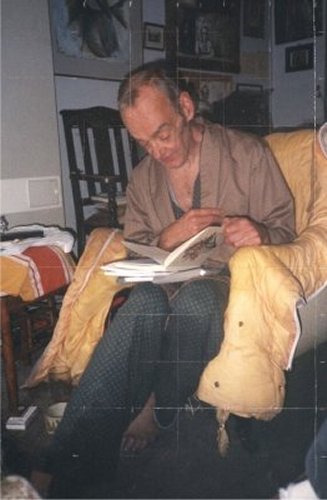
|
Nicole deWilde writes: "Numerous times it fell to me to 'bin' Pat - or rather, should I say, to take him into the psych hospital. At first, I felt very bad about this. But I soon realised that a week in hospital forced him to get it together very quickly. For, as Pat said, 'There are so many bored people in there. All they want is attention.'
One Christmas, I got a phone call from his mother, Enid, asking me to come and get Pat. She had woken up to see him leaving the grounds of Bureel, the family mansion in Elsternwick, wearing only a pair of carpet slippers; he was off for a morning stroll around the neighborhood. My friend and I ran around the grounds of Bureel, while Enid paced around the first floor balcony, calling out, "There! He's over there in the shrubberies."
When we finally got Patrick into a cab, I became concerned that he would try to escape at the stoplights. So I took the driver aside and had a word to him. At every stoplight, the driver would ask Pat, in a heavy Greek accent, if he would please read some more Blake poetry to him. Of course Pat obliged.
Another Christmas, in Sydney, Pat and I and two other friends were in Badde Manors Café. It was late at night but the café was full. Patrick was in a very maudlin mood and he said, apropos of nothing in particular, 'There's a photo of me in a group when I was a child, and you look upon that child and you can see that it has one less skin than all the rest.'" |
[Above] Patrick reading at home. (Photo by Bill Cobbett, 1998-2003)
So where was home for Patrick? He had fond memories of Ireland and the farm. After Enid died and Bureel was sold, Patrick lived in his small home in Fitzroy. But home was mostly where his friends were.
John Edwards writes: "Patrick's religious beliefs were often contradictory. He fully understood and shared Blake's radical view of Christianity, which involved a complete rejection of organised religion. But like many an Irishman, Pat had a tiny bit of a sentimental yearning for the Catholic Church, which I did not and do not share. Although he is buried as 'an Anglican' I don't think he ever embraced'the Church of England. If he did, it would have been the 'bells & smells' of High Church, which may have impressed him - his sense of ceremony and theatre would have been stimulated.
Finally, it is his enduring will to live and to embrace the poetic life which will be most remembered by all of us. In spite of four attempts on his own life, ultimately he couldn't do it. That took great courage. Death offers little comfort but I was so relieved to find out that he had not succumbed to suicide but had been taken by natural causes, no doubt aided and abetted by a lifetime of chain smoking. The best part of him, his poetry, will survive as will our memories of a man who was at times childish and tiresome, but ultimately enormously courageous and lovable. Vale Patrick Alexander."

[Above] Patrick and friend. (Photo by Bill Cobbett, 1998-2003)
Poem for Patrick on Thursday 22/9/05
On Wednesday 21st September 2005 at 2pm
Patrick Alexander died of a massive heart attack - he was 65
The poet's song was stilled this day
as spring emerged bright and fragrant
as sun paused and knowing birds
sang a lover's song to tell the world
this poet's spirit had taken its leave
rounded off his artist's life
left bare the poet's stage.
Your tributes to Blake, Piaf, Lady Day
postcards from Dublin, memories of London
singing jazz at the Rainbow Hotel
the day you read Shelton's 'poem for paquita'
left the audience speechless
and your exit, triumphant, pure theatre
elegant voice resounding through
the cafes and bars of Gertrude Street
And the colour you brought us
your poems, yourself
and literally flowers from a florist
or on days short of money
pinched from a garden
on your way to the 'Dan'
sometimes those fragile blooms
shook and trembled along with you
on a good day sometimes not
You were adoring your muse
honouring the goddess in every woman
and I remember long ago - when
in melancholic mood -
you told me it was Melpomene
muse of tragedy & song
who never left you.
Spring's equinox
this lovely day you chose to leave
with your voice that rose in love and pain
that will sing forever in our hearts and ears
you needed love dear friend
and O, how we loved you
Pamela (Mimi) Sidney Thursday 22.9.05
* 'the Dan' : The Dan O'Connell Hotel, Carlton, Melbourne
* 'poem for paquita' by Shelton Lea
Nicole deWilde writes: "I think sometimes Patrick wished that he was heterosexual, as he had such intense relationships with women and many of his friends were exceptionally beautiful. He also loved the wonderment and friendship of children.
His gifts to me were very expensive. For example, he once bought for me a vintage (1930's) Christian Dior evening gown, which he insisted on buying for my birthday. His own sense of style was exultant; flamboyant and elegant and very bohemian. I always enjoyed his beautiful vintage ties and scarves.
Pat was hopeless at housework of any kind (cooking, organisation, etc.) but he always had a strong sense of his own visual presentation. His rooms were always chaotic and yet he never went anywhere without carefully considering which brooch, scarf or tie to wear with a certain jacket. His sense of colour was extremely developed. He would often hold forth on what was the hue or tone of a particular object of fabric.
Patrick was larger than life (and sometimes the loudest) at the centre of Melbourne and Sydney bohemia, throughout the 60's, 70's and 80's, when it was all so eccentric and magical. Another name Patrick had for himself was 'Freely Orbiting Funkybopper'.
Shortly after Pat died, I was cleaning up and a wooden beetle fell off a picture frame. As I picked it up and held it in my hand, I heard Pat's voice singing A.A. Milne:
'It was Alexander Beetle
and I thought I heard him say
I am really very sorry
that I had to run away'.
To conclude this article about Patrick Alexander's life, here is a poem written by Cornelis Vleeskens. Cornelis is a graphic illustrator and had a long and creative working relationship with Patrick, collaborating on many books of Patrick's poetry:
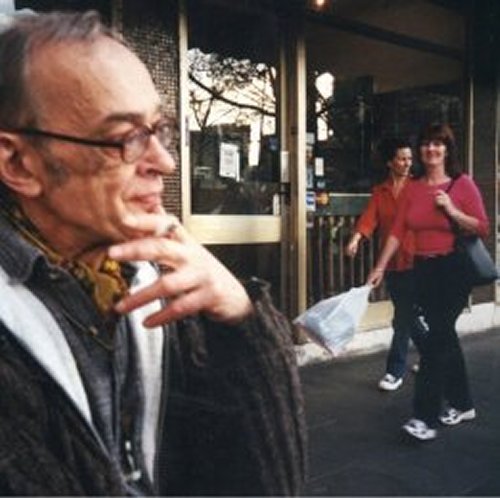
|
Parting words
Before leaving home
I rub the NG carving's
androgynous belly
knowing that
your first question will be
& how is the house person?
No-one understands my house
like you & no-one
could get more lost here!!
Yes Patrick! You
always were my naughty child!!
& we both know
that the next words
from your mouth
will be your latest poem…
The one for Andrea
(I hadn't heard ... you tell me
in a quavering voice |
[Above] Patrick contemplative. (Photo by Bill Cobbett, 1998-2003)
before reading…
& at the poem's ending
you look me in the eye
& say: That's the way to go ...
A heart attack ... Quick
A split second & it's over!
We don't talk long
a glass of red a cigarette
& you are dozing in your chair
upset that you've mislaid
the present you want to give ...
You know you never had to buy me!
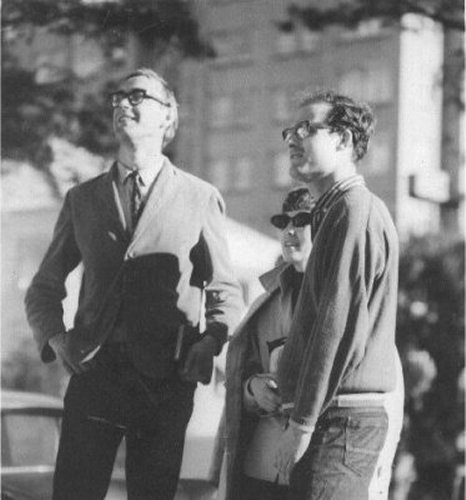
|
I've seldom seen you so contented
Assured you say at last
that people accept you
as a poet & as a person…
(Did you really
doubt that all these years?
Sorry ... I'm raving ...
I convince you
you should go to bed
rather than sleep in that chair
& I stay up with the winecask
my familiar companion ...
& as I fall asleep
in the spare room
you go downstairs
& softly play
Lady Day all night long
In the morning I find
you fighting the kettle
for a cup of tea ...
I take a quick shower
& have to rush…
I leave you standing there ...
You stand there still! |
[Above] Patrick A, Joanna Robertson and Ken Stewart (Photo by Harold Ciddor, 1961)
In conclusion, the sad part about Patrick's death is realizing what a void is left in the Melbourne poetry and performance venues by his passing. It is just not the same going to the Dan O'Connell Hotel or The Spinning Room and knowing that Patrick won't appear. However, Pat still does appear regularly in people's conversations and dreams. There are many other great performers still around but not many with the dramatic range and also the knowledge of arts and literature that Patrick possessed. Personally, I - like everyone - will
miss having a friend that could answer almost any question I had about art, literature, history and mythology. Having coffee with Patrick was the equivalent of being simultaneously inside a great library and a great theatre: imagine if your favourite library and theatre could speak to you and take on a living character. Then throw in your favourite street scene that has both beatific and refined qualities. Then add to this description a pair of large eyes that could convey every feeling you've ever known or not yet known. I know I rave on as my words don't seem enough to describe the living presence of Patrick Alexander. Perhaps it is just best to imagine him as the creature of his Chinese astrological year of birth: the dragon - a mythical, frail, sensitive and glorious dragon that sings.
About the Writer Peter Davis

|
Peter Davis is a freelance writer and radio documentary maker. He is studying writing and editing at RMIT. Peter has had two plays produced: 'Letting in the Lion', Universal Theatres 1995 and 'Positively Everything', broadcast over 6 weeks on the national community radio program, 'Out and Out.' He won the Community Broadcasting Association of Australia award in 1995 for Best Information documentary for 'The Joan Golding Story'. He has produced regularly as a freelancer for ABC Radio National including 'Poetica' and 'Radio Eye'. He co-produced a documentary about hermits for Radio Eye in 2005. Peter lives in a small town in Victoria; where he can walk a few minutes down the road and be in a bit of forest. |
[Above] Photo of Peter Davis by Peter Davis, 2005.
I Next I
Back I
Exit I
Thylazine No.12 (June, 2007) |



